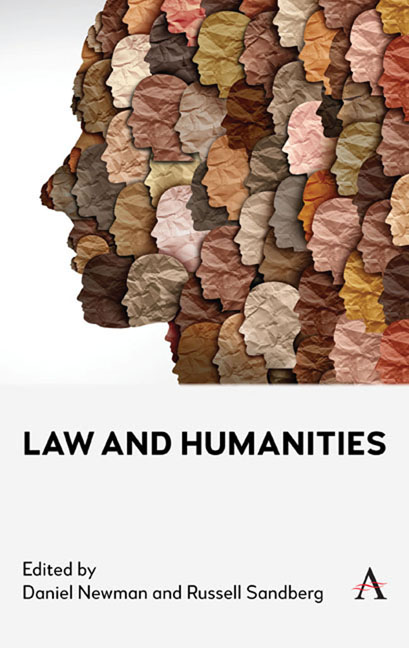Book contents
- Frontmatter
- Contents
- Preface
- List of Contributors
- Chapter One Introducing Law and Humanities
- Chapter Two Law and Archaeology
- Chapter Three Law and Comics/Graphic Justice
- Chapter Four Law and Film
- Chapter Five Law and Geography
- Chapter Six Law and History
- Chapter Seven Law and Literature
- Chapter Eight Law and Philosophy
- Chapter Nine Law and Popular Music
- Chapter Ten Law and Religion
- Chapter Eleven Law and Television
- Chapter Twelve Law and Theatre
- Chapter Thirteen Law and Theology
- Chapter Fourteen Law and Video Games
- Chapter Fifteen Conclusion: Subverting the Law and Humanities Canon
- Index
Chapter Three - Law and Comics/Graphic Justice
Published online by Cambridge University Press: 27 March 2024
- Frontmatter
- Contents
- Preface
- List of Contributors
- Chapter One Introducing Law and Humanities
- Chapter Two Law and Archaeology
- Chapter Three Law and Comics/Graphic Justice
- Chapter Four Law and Film
- Chapter Five Law and Geography
- Chapter Six Law and History
- Chapter Seven Law and Literature
- Chapter Eight Law and Philosophy
- Chapter Nine Law and Popular Music
- Chapter Ten Law and Religion
- Chapter Eleven Law and Television
- Chapter Twelve Law and Theatre
- Chapter Thirteen Law and Theology
- Chapter Fourteen Law and Video Games
- Chapter Fifteen Conclusion: Subverting the Law and Humanities Canon
- Index
Summary
Introduction: Intersections of Comics and Law
This chapter examines the development of law, comics and graphic justice as a distinct area of scholarly activity within the context of law and humanities study. The core focus of this chapter’s discussion is the Anglo-American conception of law and comics studies, particularly that situated within the UK, North America and Australia. In these areas socio-legal studies, and law and humanities scholarship incorporating comics study has firmly established itself since the 1990s. This is not to ignore the existence of other, wider forms of comics studies which consider law and graphic justice, and, indeed, even within this chapter’s discussion it is worth noting that law and comics and particularly ‘graphic justice’ scholars examine Japanese popular culture and manga comics. However, this chapter’s focus is on the Anglo-American and Global North field of law, comics and graphic justice study rather than a specific analysis of the texts and mechanisms contained within the discipline’s academic focus and in Anglo-American and Global North comics production.
Before exploring the development and nature of the law, comics and graphic justice field, some brief discussion of the nature of academic study of comics is necessary for context. The terms ‘comics’ and ‘graphic novels’ are sometimes used interchangeably and for the purpose of this chapter’s discussion the distinction between a weekly or serialised comic and a standalone graphic novel or graphic novel series is largely irrelevant. Undoubtedly there are differences between the two, particularly in those instances where a graphic novel represents a standalone story or collected narrative specifically constructed for the graphic novel medium as opposed to a long-running comic series such as the X-Men, which explores more diverse narratives and a series of narratives over a longer period. In the latter case, issues may be collected together as a trade paperback or collection, which arguably is almost indistinguishable from a graphic novel. In this sense, comics can be either short or several hundred pages long and there is considerable variation in what is accepted as a comic or graphic novel. However, for the purpose of this chapter’s discussion, the medium of comics and field of comics study is the core focus of the academic inquiry, that of visual storytelling usually based within the sequential art-based comic book form.
- Type
- Chapter
- Information
- Law and Humanities , pp. 37 - 50Publisher: Anthem PressPrint publication year: 2024



